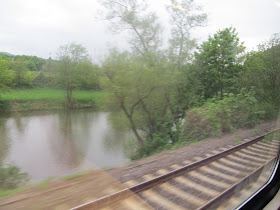For the last three weeks I spent some time in Germany. Arriving in Frankfurt in early May, I was greeted by rainy and cold weather. Still, the views from the train on my ride home were nice since it reminded me how much different the landscape is from my current home in North Carolina.
 |
| copyright Durhamonthecheap - Picture from the train ride |
The picture above is typical of the view from the train. In between stations, there are long stretches of nothing. The area of the Hunsrueck is a mostly rural area, with little industry and has experienced significant population loss in recent years. A recent blog entry by a Stanford professor about the impact of mismanagement in urban planning and the lack of infrastructure, while heavily criticized by many, hits the nails on its head in my opinion. The vast majority of young people that attend university will never return, leaving many towns and villages with an aging population and significant population loss in recent years.
 |
| copyright Durhamonthecheap - the train station at Bad Muenster |
Not to sound all gloomy. The area still has its charms. Many towns have nicely maintained old building, above a building from the town of Bad Muenster. While the building seems well maintained, the cars parked at the train station speak to the infrastructure problem in the area. Many people rely on the train to travel to the bigger cities of Mainz and Frankfurt to earn a living. While a train ride will take less than one hour, this distance is significant for Germany and the trend to commute has gained in importance in recent years as advanced and better paying jobs are just not available anymore in smaller towns and villages.
Bad Muenster used to be a thriving spa town, not as well known as Baden Baden, but it employed a lot of people and still retains significant income from health-related services to rehab services. But today, more and more businesses, even in the town center, are closed and the lack of jobs is evident. The economic downturn has hit people and towns all over world, even in North Carolina unemployment has increased, but towns like Bad Muenster and the whole area of the Hunsrueck experienced the downturn years before it hit the rest of Germany. Problems in city planning and lack of infrastructure, such as roads, hit the area back in the 80s and have become magnified through the economic downturn of recent years.
 |
| copyright Durhamonthecheap - view from the train on some vineyards |
The people in the Hunsrueck are used to tough times. The soil is bad and so even during the 1880s, a lot of people sought their future in other countries, migrating to the USA and South America. There is still a significant regional impact of Hunsrueck descendants in Brazil. These people brought back to Germany what is today the regional specialty "Spiessbraten" - more about that later on. Some areas are suitable to grow grapes for wine, but many of the hills are steep. I was initially surprised to see vineyards not be located on steep hills when I came to the USA. The sloping hill in the picture above is not nearly the steepest hill that is used for growing grapes. Most areas of the Hunsrueck cannot be used to grow grapes, traditionally the area was used to grow vegetables such as potatoes and turnips. Today, EU energy subsidies have caused an increased use of rapeseed, which creates vibrant spots of yellow in the landscape, especially in the Spring.
Even without rapeseed, the naturally rugged landscape has its charms. It is great for hiking because the of the many mountains and the rural character of wide stretches. You can see the hilly, mountainous nature of the landscape in the picture below.
 |
| Copyright Durhamonthecheap - view from the train |




No comments:
Post a Comment